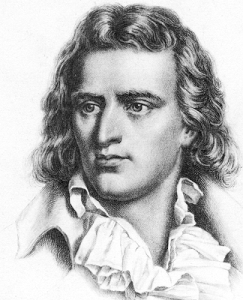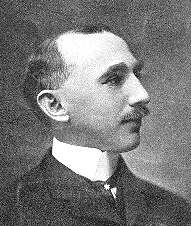The Satyr And My Muse
By Friedrich Schiller
1759 – 1805

An aged satyr sought
Around my Muse to pass,
Attempting to pay court,
And eyed her fondly through his glass.
By Phoebus’ golden torch,
By Luna’s pallid light,
Around her temple’s porch
Crept the unhappy sharp-eared wight;
And warbled many a lay,
Her beauty’s praise to sing,
And fiercely scraped away
On his discordant fiddle-string.
With tears, too, swelled his eyes,
As large as nuts, or larger;
He gasped forth heavy sighs,
Like music from Silenus’ charger.
The Muse sat still, and played
Within her grotto fair,
And peevishly surveyed
Signor Adonis Goatsfoot there.
“Who ever would kiss thee,
Thou ugly, dirty dunce?
Wouldst thou a gallant be,
As Midas was Apollo once?
“Speak out, old horned boor
What charms canst thou display?
Thou’rt swarthy as a Moor,
And shaggy as a beast of prey.
“I’m by a bard adored
In far Teutonia’s land;
To him, who strikes the chord,
I’m linked in firm and loving band.”
She spoke, and straightway fled
The spoiler, he pursued her,
And, by his passion led,
Soon caught her, shouted, and thus wooed her:
“Thou prudish one, stay, stay!
And hearken unto me!
Thy poet, I dare say,
Repents the pledge he gave thee.
“Behold this pretty thing,
No merit would I claim,
Its weight I often fling
On many a clown’s back, to his shame.
“His sharpness it increases,
And spices his discourse,
Instilling learned theses,
When mounted on his hobby-horse
“The best of songs are known,
Thanks to this heavy whip
Yet fool’s blood ’tis alone
We see beneath its lashes drip.
“This lash, then, shall be his,
If thou’lt give me a smack;
Then thou mayest hasten, miss,
Upon thy German sweetheart’s track.”
The Muse, with purpose sly,
Ere long agreed to yield
The satyr said good-by,
And now the lash I wield!
And I won’t drop it here,
Believe in what I say!
The kisses of one’s dear
One does not lightly throw away.
They kindle raptures sweet,
But fools ne’er know their flame!
The gentle Muse will kneel at honor’s feet,
But cudgels those who mar her fame.

